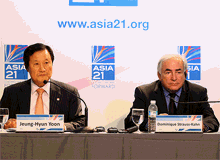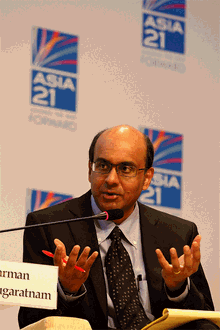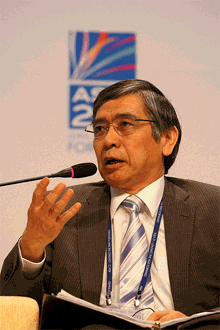
Typical street scene in Santa Ana, El Salvador. (Photo: iStock)
IMF Survey: Asia and IMF Forge Stronger Partnership
July 13, 2010
- IMF commits to "Daejeon Deliverables" to renew relationship with Asia
- Conference discussed impact of Asia becoming global economic powerhouse
- Increasing role and voice for Asia in the global economy
- Korean Finance Minister Yoon Jeung-Hyun (l) sits alongside IMF chief Dominique Strauss-Kahn at conclusion of Asia 21 Conference (IMF photo)
- Singapore Finance Minister Tharman Shanmugaratnam says lessons of recent crisis center on interconnectedness of markets (IMF photo)
- Asian Development Bank President Haruhiko Kuroda welcomed recent policy changes, more flexible approaches at IMF (IMF photo)
Wrapping up a two-day conference on Asia’s future, IMF Managing Director Dominique Strauss-Kahn announced a set of commitments, labeled the “Daejeon Deliverables,” that he said will significantly strengthen the Asia-IMF partnership in a year that South Korea chairs the Group of Twenty (G-20).

Korean dancers in traditional costume perform at official dinner during Korea-IMF Asia 21 Conference in Daejeon, Korea (IMF photo)
ASIA 21 CONFERENCE
Acknowledging that the IMF’s relationship with Asia had been damaged during the 1997–98 Asian crisis, Strauss-Kahn said the IMF had changed and learned important lessons that had helped the 187-member global institution tackle the recent global economic crisis better.
“This conference has been an opportunity for the IMF to begin the process of stepping up its engagement with Asia,” said Il SaKong, chairman of Korea’s G-20 summit presidential committee.
More than 1,000 regional economists, bankers, analysts, and financial media crowded into the Korean city of Daejeon for the conference, titled “Asia 21: Leading the Way Forward,” hosted by the Korean government and the IMF.

Korean Finance Minister Yoon Jeung-Hyun (l) sits alongside IMF chief Dominique Strauss-Kahn at conclusion of Asia 21 Conference (IMF photo)
“The conference has provided a useful opportunity to reflect on Asia’s success over the past decade, but also to have a frank exchange of views on the challenges for the region going forward,” Il SaKong stated.
IMF’s commitments
At a concluding press conference, Strauss-Kahn made three key commitments to Asia, which is leading the world out of the recession caused by the global financial crisis, but which now faces challenges from large capital inflows that may trigger economic overheating.
• The IMF will work to make its analysis more useful and available to Asian members. This includes strengthening the IMF’s early warning systems, sharpening its focus on cross-border spillovers, and increasing work on cross-cutting themes, including macrofinancial linkages. It committed to a more even-handed approach to its surveillance of economies around the world.
• The IMF will work to strengthen the global financial safety net. To do so, the Fund will work closely with Asia—through Korea’s leadership on this issue in the G-20. The IMF is examining several options to strengthen its tools to help prevent crises and mitigate systemic shocks, including more tailored crisis prevention facilities and multi-country approaches.
• The IMF will support the further strengthening of Asia’s role and voice in the global economy. This can be done, first of all, by building on the package of 2008 IMF reforms which boosted Asia’s voting power in the Fund. The IMF is working on a second stage to be completed by the G-20 summit in Seoul in November. In addition, the Fund will strengthen its collaboration with regional organizations in Asia—and, as a first step, Asia will be represented at a major meeting on this issue that the IMF is organizing in October 2010.
Strauss-Kahn said he wanted to make Asia feel at home at the IMF and become more involved in global solutions.
For Asia’s low-income countries, Strauss-Kahn noted they have the potential to become the next generation of emerging markets. Delegates also focused on continued inequality in Asia, despite the growing prosperity, with the IMF Managing Director talking about inclusive growth.
Asia’s pivotal role
Delegates at the conference noted that Asia has shown remarkable resilience during the global financial crisis and has emerged as an economic powerhouse that is leading the global recovery. But with parts of the world still seeing sub-par growth, Asia should shift away from exports toward domestic demand as it continues to raise living standards.

Singapore Finance Minister Tharman Shanmugaratnam says lessons of recent crisis center on interconnectedness of markets (IMF photo)
“For the Asian region to play a pivotal role in the global economy, it is necessary to enhance domestic demand through continued structural reform, and strengthen international cooperation, as well as regional cooperation, to resolve global imbalances and establish a global financial safety net,” said Finance Minister Yoon Jeung-Hyun.
Yoon told the press conference that Korea was working with the IMF to develop an effective international financial safety net following the global crisis that would be discussed at the Seoul summit. Plans for the safety net include proposals to broaden contingent financing that countries could draw on in case of trouble, and a global stabilization mechanism that could create swap arrangements between regional mechanisms.
“I was impressed by Mr. Strauss-Kahn saying that the IMF would strongly support regional financial safety nets like the Chiang Mai Mechanism,” said Haruhiko Koroda, President of the Asia Development Bank. “All in all, I think the IMF has really changed and I think it is now really on the side of the Asian countries to respond to these significant changes.”

Asian Development Bank President Haruhiko Kuroda welcomed recent policy changes, more flexible approaches at IMF (IMF photo)
“We have the opportunity to develop a financial safety net which involves both regional coinsurance and the IMF as global insurer, “ said Singapore Finance Minister Tharman Shanmugaratnam.
“We are better off with both regional surveillance and IMF surveillance rather than one or the other. It will also enable us, when crises hit, to respond with the speed and magnitude that modern day crises need. The lessons of the past two years is about interconnectedness, no matter where a crisis starts … contagion is fast and furious.”
Strauss-Kahn said he was pleased at the recognition of the changes that had been undertaken at the IMF. The Fund had played a large role in helping to resolve the recent global crisis, it had become more flexible, especially on the conditions attached to loans, and had put new emphasis on social goals and helping the most vulnerable during a crisis. “Most of the old devils have been killed and I think that lays the foundations for doing something new, working together,” he told a roundtable discussion.







